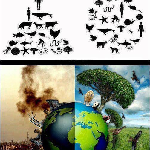Pitch
Constructed Wetlands reclaim water while reduce Carbon Footprint, increase Biocapacity and their desentralization improve resilience.
Description
Summary
In the Ecological Footprint, water is not included as a biosphere product that is consumed; instead, it is transferred within its hydrological cycle between ecosystems and human communities.
Water desalination powered by renewable energy sources can lead to provide enough water while reduce emissions and preserve biocapacity in the archipelago. In addition, conventional water depuration can switch to a biological depuration through decentralized constructed wetlands; thus resilience is enhanced not only because of the Carbon Footprint reduction, moreover desalted water is recycled raising the regional hydrological budget, and what is more, the use of vegetation (Phargmites Autralis) in those alternative depuration systems should increase Biocapacity.
To contextualize the ecological footprint of industrial water production in a region, previously we calculate its whole ecological footprint, starting from the methodology established by the Global Footprint Network. In this work, the Spanish national ecological footprint will be taken as reference-National Footprint Account (2005). The industrial production of water is segregated from the regional carbon footprint, thus it allows assessing the impact of two alternative scenarios: one completely dependent on fossil fuel, another powered by wind energy and sewage treated by constructed wetlands. While conventional industrial water cycle produces 30% of the energy production EF, the alternative scenario would compensate approximately 60% of it. According to this framework, desalted water can be recharged in the regional hydrological budget through decentralized constructed wetlands. It is a fact that desalination has environmental costs, and sewage treatment can compensate them; to certain extent resilient water management means a broad view of the whole artificial water cycle.
Category of the action
Mitigation/Adaptation, Changing public attitudes about climate change
What actions do you propose?
i) the objective of this study is to estimate the viability of the Ecological Footprint as a tool for the enhancement of resilience through water management; ii) all insular constraints (geographic, climatic and socio-economic, historical, political or technical) make the water a difficult issue to analyze regionally. Each island has its own specificities to maximize its natural water resources (without endangering island ecosystems); iii) desalination is an option within a myriad of actions, for the sake of a resilient management in its natural, social and economic reality; iv) decentralize hybrid constructed wetlands offset water industrial production, enhancing biomass and bringing down carbon emissions related to conventional depuration.
Who will take these actions?
Where will these actions be taken?
What are other key benefits?
- Multifunctional land use, not only for reclaim water, it is feasible to produce compost, biogas, and fishery.
- Tourism attractive.
- Educational activities.
